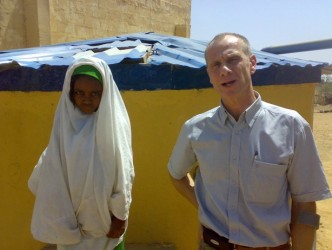
On the road the other day and decided to swing by and see how the rain harvesting scheme at Gidan Mutan Daya primary school, Katsina was getting on now, over 3 months into the dry season. When I last visited the tanks had just received the first rains and we were curious to see how long into the dry season they could provide clean water for the children, especially girls to use. A previous attempt to sink a bore hole had failed to locate water in this dry environment.

Full of optimism I arrived around noon on a blistering hot day, but ominously the teachers started to smile sheepishly and as if by magic a clutch of pupils ran across the playground, clutching buckets in search of water as they left school early. One of the primary girls Rabi and I clambered up and peered into the tank, nothing but a lizard den inside: an ideal school biology laboratory exercise perhaps, but not much needed H2O.
The teachers explained that the tank never filled up in the first place, the water leaked out from the joint to the drain pipe, enough to fill buckets, but not the reservoir. "What did you do fix the problem, surely it would have been simple to solve this?" I asked. The responses were vague, "We called he installer", etc..., but at the end of the day the school / community hadn't bothered to try to make it work.

It's difficult to know what to say / do in these situations. We talk a lot about community engagement and capacity building, but often 'Things Fall Apart' all too easily. Hopefully come June and the next rains the school based management committee will try to get this scheme working, at least none of the pipework had been stripped for other purposes yet!
It is important to look for the positives, I wonder how the other 30 similar schemes fared? I'll try to find out next time...

2 comments
Comment by Rev. Evatt Mugarura posted on
It a very discouraging situation but it provides a learning experience for better planning in future.
I am glad you now have a school management committee that is going to take responsibility of the project. I do not know how much they were involved initially. Involvement of community is key in project sustainability. Without their active participation, the project remains remote to them. It's common to hear the community members saying ''this project of so and so......". This has a negative effect when it comes to maintaining the project.
Through my initiative ' Africa Youth Leadership Development and Health Initiative" our approach is to first create awareness of the problem, then people respond by asking for related services. At the time of request is when we begin serious engagement; resource mobilization, formation of village committees to oversee the project, monitoring and evaluation system plan, sustainability and the like. The awareness exercise is done with the help of our community health trained youth volunteers The approach applies to any project and I am sure it can be helpful in water supply projects too. Key to this is "Raising awareness for arouse demand for a service".
Thank you for your effort to serve humanity.
Comment by Iris Krebber posted on
I am all to keenly aware of how you felt when you saw what had happened. This is where change is urgently need to ensure that community involvement and participatory approaches from day 1 onwards do not just remain empty slogans. With my organisation Welthungerhilfe (German Agro Action) we have supported community based WASH projects in various African countries for many years, including in many schools. Although we have had surprisingly few similar disappointments, they do happen. We have also found - and the same is confirmed through many longer term studies - that supporting unserved communities with infrastructure plus a bit of community training is not enough. One would assume that as most schools already have a half-way functional school management committee, using these as change and maintenance/operation agents would make it very easy. It does not, unless such projects are supported by low key advice, faciliation, refresher trainings etc. over a longer period after the peak support has ceased and the infrastructure is in place. Even sustained demand for service is rarely enough to trigger a lasting change in thinking and behaviour. However, in the absence of committed, capable and responsible local government structures to assist communities, it can only be the users themselves and their representatives who can assure their own sustainable services. If donors are willing to support a significant up-front infrastructural investment, they should also consider the comparatively low cost addition of 1-3 years of low key advisory, retraining, support and governance strengthening services to beneficiary communities to really achieve the much lauded sustainability and value for money. Things do fall apart - but they do not have to! Good luck with your valuable efforts!